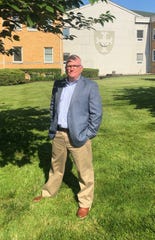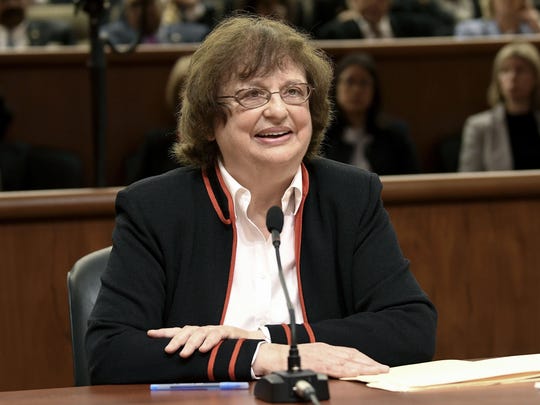"Secret" Catholic Files Called Key to Exposing the Full Clergy Abuse Scandal
By Deena Yellin
Novozinsky, who authored a book, "Purple Reign: Sexual Abuse and Abuse of Power in the Diocese of Trenton, New Jersey" in 2012, is convinced that the church hierarchy knew that Brown was a predator but neglected to act. He is now calling for the Trenton Diocese to release the personnel records of his abuser and other accused priests so that he and his attorneys can review any reports of abuse that the church received and any actions taken, or not taken, by church officials. "For decades, the Catholic church covered up an insidious culture of predatory child abuse, doing everything in its power to protect abusers and silence and intimidate victims and their families. Details of the abuse were held under lock and key in 'secret files' hidden from public view. It's past time for those secret files to be made public," Novozinsky wrote in a letter to Bishop David M. O'Connell of the Diocese of Trenton. O'Connell has not responded. Across the country, victims of clergy abuse and their advocates are demanding that dioceses release their personnel records — often referred to as their "secret files" — so that the full truth can be revealed about decades of sexual-abuse allegations. "The Catholic Church uses First Amendment arguments about freedom of religion and the establishment clause to oppose victims from obtaining the files or archives," said attorney Mitch Garabedian, who has represented numerous clergy abuse victims. The Catholic Church's Code of Canon Law requires every diocese to maintain a secret archive — a locked safe for storage of the "most carefully guarded" documents. Only the bishop is to have the key. These archives are believed to contain priest personnel files, including potentially incriminating information about allegations of abuse and the participation of supervisors in cover-ups. In other words, who was told what, all the way up the chain of command. Obtaining access to the documents is not easy. It took Garabedian over three years to obtain the secret files held by the Archdiocese of Boston regarding John Geoghan, a priest and serial child rapist in the 1960s and 1970s, who was moved from parish to parish after being treated for pedophilia and eventually defrocked. The records "indicated that Cardinal (Bernard) Law knew that Geoghan had been sexually abusing children but did not warn the public or authorities when he transferred Geoghan to St. Julia’s Parish in Weston, Massachusetts, where he continued to sexually abuse children," said Garabedian. Lists of accused not enough Growing numbers of dioceses have released lists of credibly accused priests in recent years and established compensation funds for clergy abuse victims, but survivors across the country like Novozinsky say it's not enough. They are calling for the church to release their "secret files." Attorneys say those files hold the key to discovery in civil lawsuits because they contain information regarding clergy, and ultimately, potential church misconduct. Some dioceses across the nation have agreed to release their complete files either voluntarily or as part of a lawsuit or court settlement, observed Novozinsky's attorney, Jay Mascolo of RAM Law in New Brunswick, New Jersey. Among them are the dioceses of New York, Los Angeles, Portland, Oregon, Santa Fe, New Mexico, all the dioceses in Colorado, seven of the eight dioceses in Pennsylvania, and the dioceses of Joliet and Chicago in Illinois. Most recently, the Iowa Attorney General has asked Catholic officials to provide records on clergy sexual abuse. In New York state, the files of all eight Catholic dioceses are being turned over to the state Attorney General's office. Last September, Acting AG Barbara Underwood subpoenaed the eight dioceses, seeking documents related to sex-abuse accusations, investigations and findings.
Underwood and other state AGs started civil probes in response to last year's high-profile Pennsylvania grand jury report about clergy sexual abuse. She said the report "shined a light on incredibly disturbing and depraved acts by Catholic clergy, assisted by a culture of secrecy and cover ups in the dioceses. Victims in New York deserve to be heard as well — and we are going to do everything in our power to bring them the justice they deserve." The AG's office in New York state cannot convene a grand jury, but is partnering with district attorneys across New York if the need arises to prosecute criminal offenses. The Archdiocese of New York has shared information from its files with the 10 district attorneys within the jurisdiction of the archdioceses, said Joseph Zwilling, spokesman for the archdiocese. "We are now complying with a subpoena from the New York State Attorney General's office for the same information, so it's all being shared with them as well," he said. The office of current Attorney General Letitia James would not comment on an ongoing investigation. At around the same time last fall, New Jersey Attorney General Gurbir Grewal said he was forming a task force to investigate allegations of abuse by Catholic clergy and cover-up attempts by dioceses. When New Jersey's five dioceses in February released the names of nearly 200 priests accused of abusing minors, Grewal said his investigation was ongoing and that has office had received hundreds of calls to a tip line. "The investigative work of the task force continues so that we may assure that all survivors of clergy abuse are heard and all abusers and institutions are held accountable for their acts," he said in a statement. "To this end, we anticipate taking criminal action wherever appropriate and releasing comprehensive information at the conclusion of our investigation." The fact that a diocese lists a priest as credibly accused does not mean it will reveal what it knows about a priest's past behavior. Nor does it mean that a diocese will accept responsibility for any alleged abuse. The complete files are important, then, because they often contain information about priests being reassigned due to allegations or sent for treatment as sex offenders and then returned to service involving proximity to minors, said Mascolo. "For a civil case, we generally need to show that the church knew or should have known the priest posed a danger to our clients before or during their abuse," he said. "So the church keeps the archives closed, and almost always claims in litigation that it did not know the priest was a danger until years later. "We ask for the secret files so we can show a jury the church understood this was a problem among priests in the diocese and with the particular priests who abused our clients." Seeking New Jersey's files Clergy abuse survivor Edward Hanratty, a Ridgefield Park native, filed a lawsuit in May against the New Jersey Catholic Conference of Bishops and each bishop in New Jersey demanding a full account of what the church knew and when they knew it. Hanratty came forward last summer after reading the Pennsylvania grand jury report, which detailed allegations against more than 300 priests who abused more than 1,000 minors. He said that after he went public with his story about his family priest abusing him, he received numerous calls from people who said that they or someone they knew had a similar experience with the same priest or other priests.
Hanratty was distraught when he discovered that his abuser was still working at a church in New Jersey. His attorneys, Jeff Anderson and Greg Gianforcaro, want all five dioceses in New Jersey to release their complete files on priests that were accused of sexual abuse. Anderson has filed similar lawsuits in other states. When New Jersey's five dioceses released a list of Catholic priests accused of abuse in February, Cardinal Joseph Tobin, Archbishop of Newark, said the list was compiled from an extensive review of records dating back to 1940. But advocates complain that nobody outside of the church has been able to see those records. "The lists lull people into thinking the church will take responsibility," Mascolo. "But if you file a lawsuit you will have to get evidence and find witness who will say that there was already an issue and this priest was moved around from church to church and these files are the most important step in that process." "Very often in court cases, the church will claim they did not know the priest was an abuser," he said. "So if Bruce wants to bring his abuser to court, he needs to prove the diocese knew he was a danger." "The lists are misleading because the church can say we didn't know these priests were bad until recently," said Mascolo. "What they don't do is go into their secret files and say 'There's this letter from 1963 showing that his supervisor moved him because he had another lapse.' " Rayanne Bennett, a spokeswoman for the Diocese of Trenton, said she "has no record of a request for information" from Bruce Novozinsky about the late Gerry Brown. She said the diocese has "no plan at this time to release personnel information beyond that which we share with law enforcement and what has already been conveyed to the public via the list on our website. We will of course respond appropriately to any court-ordered request that may come in the future."
|
.
Any original material on these pages is copyright © BishopAccountability.org 2004. Reproduce freely with attribution.


